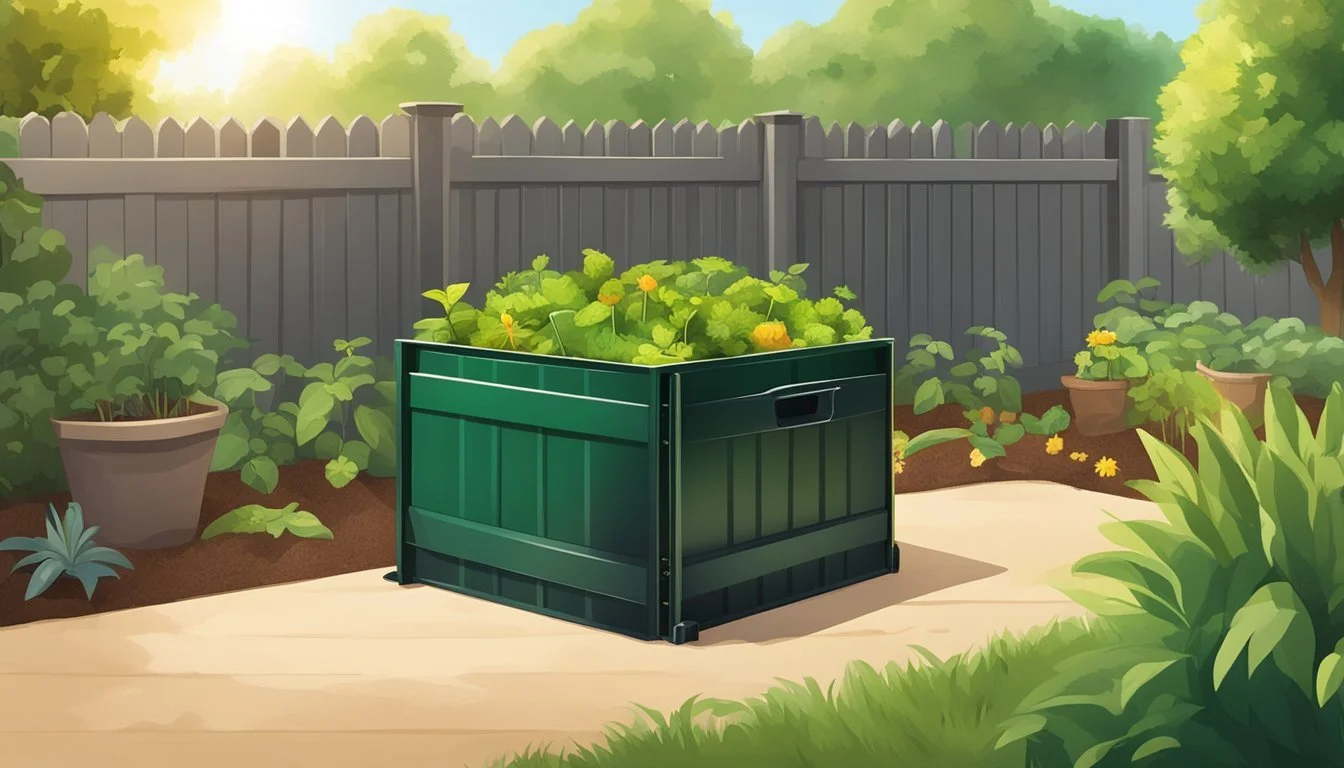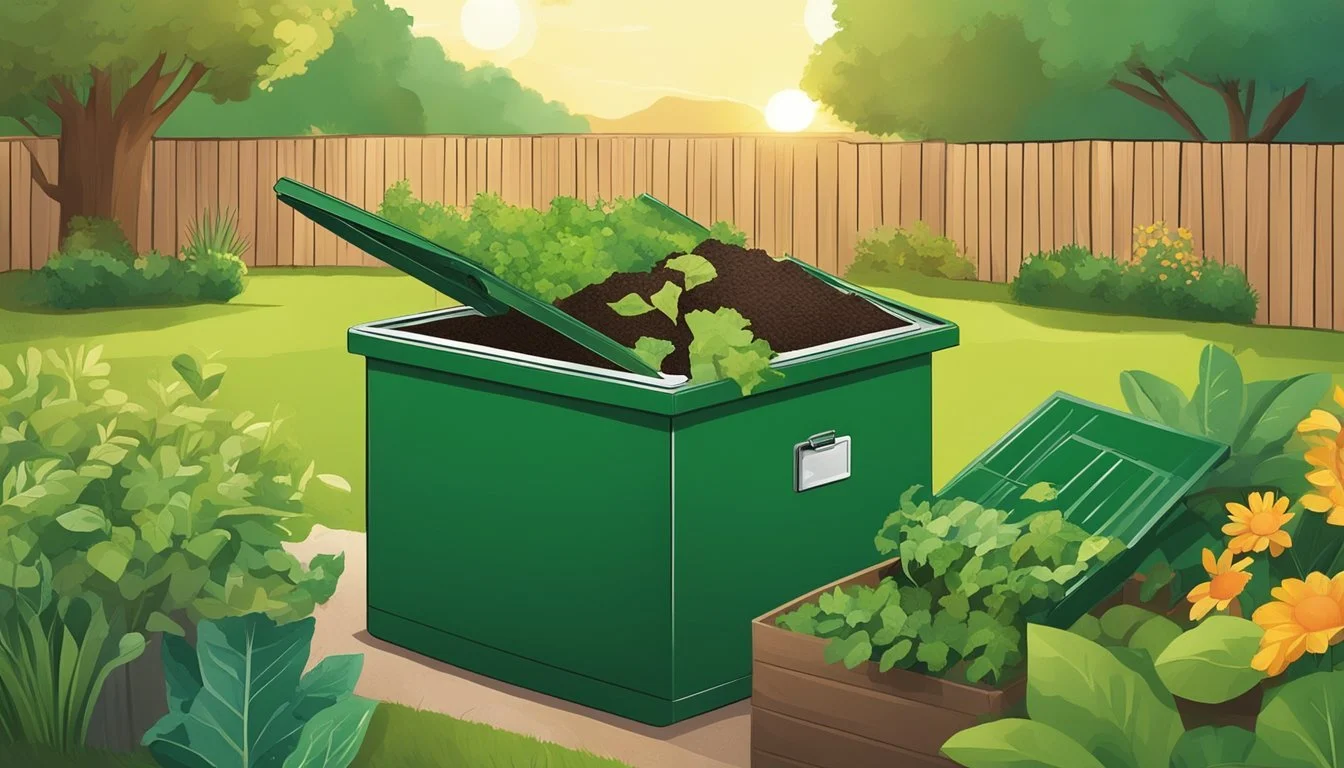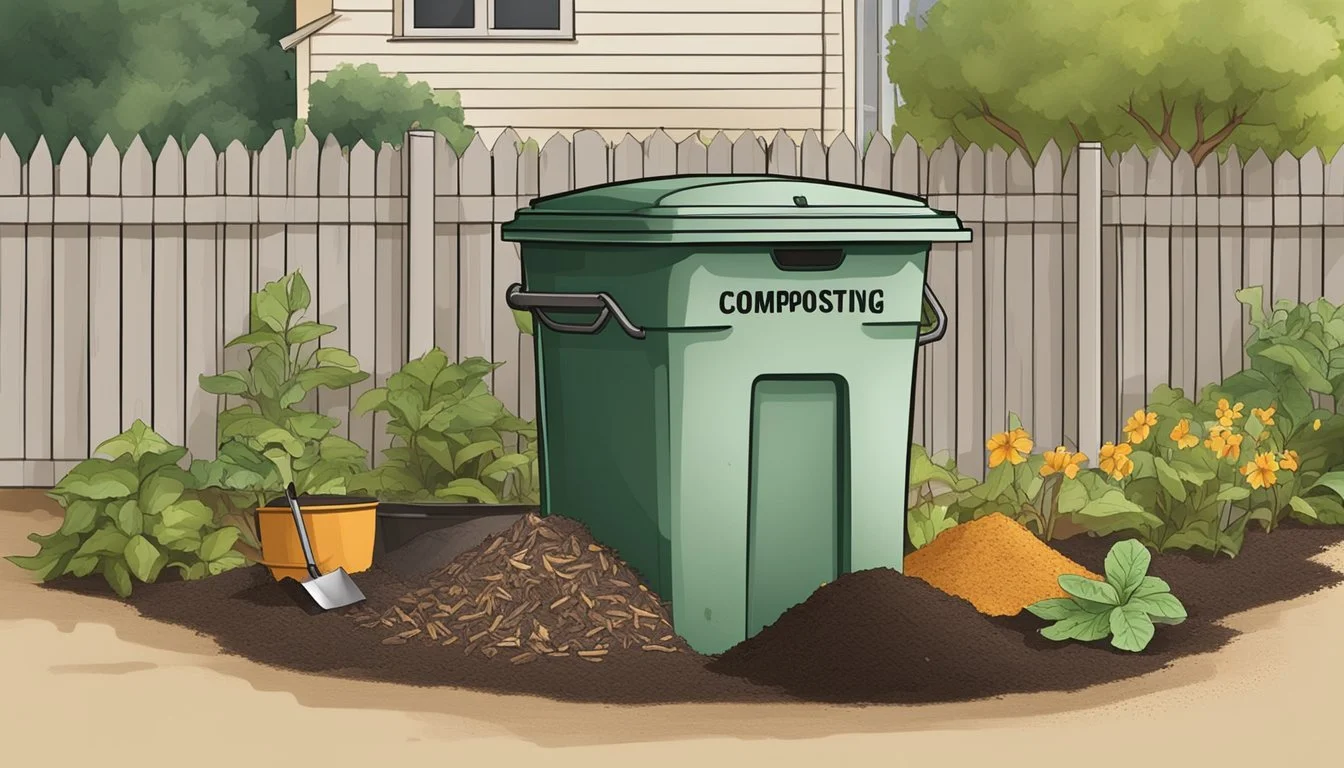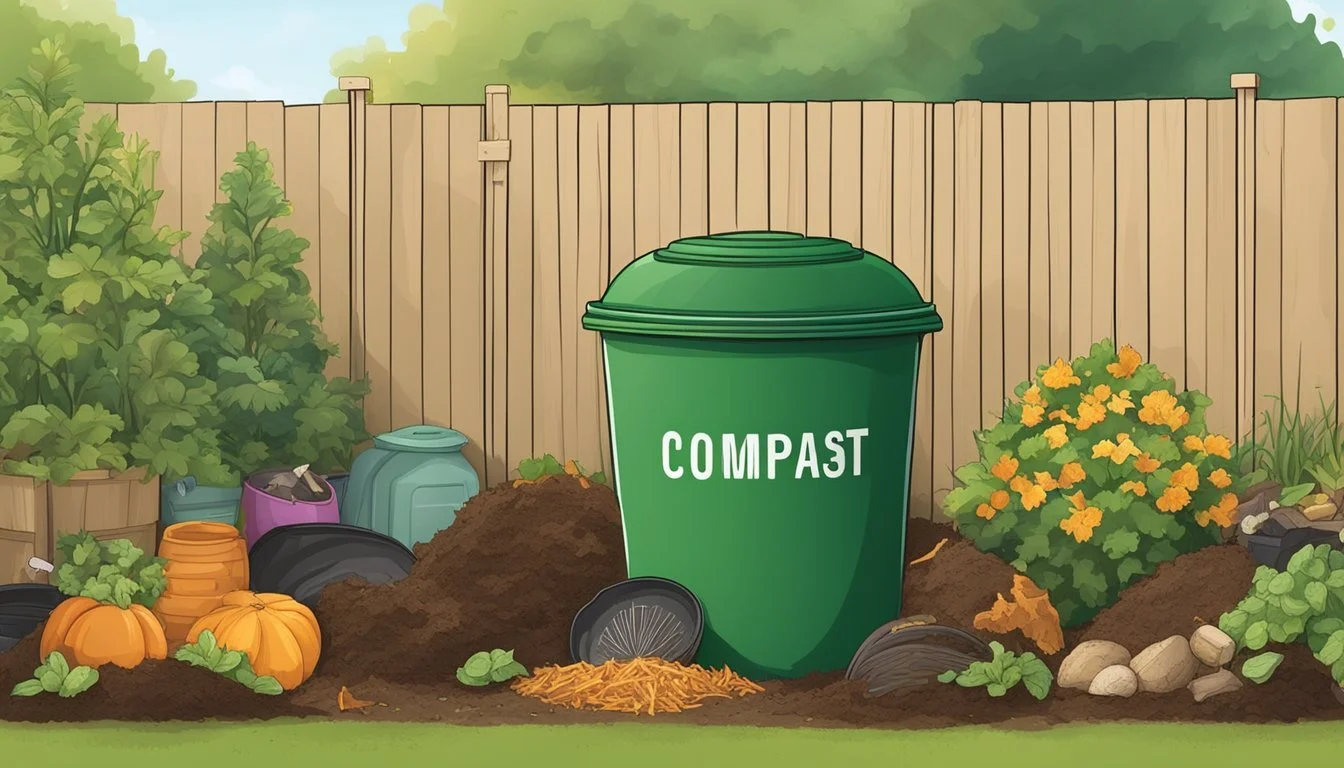Guide to Composting in Edinburg, TX
Simple Steps for Eco-Friendly Waste Reduction
Composting offers an effective way for Edinburg, TX residents to recycle organic waste into valuable soil amendments. By turning yard debris, food scraps, and other biodegradable materials into compost, individuals can enrich local soil, support plant growth, and reduce the amount of waste sent to landfills. The process, inherently simple, involves managing organic matter so that it decomposes naturally, resulting in a nutrient-rich product ideal for gardening and landscaping.
In Edinburg, the Department of Solid Waste Management provides resources and services to facilitate composting practices for both residential and commercial entities. Local programs may offer educational materials on how to start and maintain a compost pile, demonstrating the balance required between greens, browns, air, and moisture to achieve decomposition. Additionally, residents have access to compost bins, which help to streamline the composting process at home, and may also participate in community composting initiatives that promote collective efforts in waste reduction.
Understanding the local context—including the climate of Edinburg—can significantly influence composting activities. The warm temperatures in the region can accelerate the composting process, but can also necessitate more frequent monitoring and adjustment to ensure a successful outcome. Knowledge of what materials are locally accepted for composting and how to manage a compost pile properly are key to integrating this sustainable practice effectively into daily life.
Basics of Composting
In Edinburg, TX, understanding the fundamentals of composting can significantly improve soil quality and benefit the environment. This section walks through what composting entails, its benefits, and the basic principles to get started.
What is Composting?
Composting is the process by which organic matter decomposes to form a soil-like substance that is rich in nutrients. In it, materials like fallen leaves, vegetable scraps, and grass clippings are recycled into valuable compost. It's a natural method to manage and transform organic waste into a beneficial product for the soil.
Benefits of Composting
Composting offers various advantages to both gardeners and the environment in Edinburg. It enriches the soil, improving its structure, moisture retention, and fertility. It also helps to reduce greenhouse gas emissions by minimizing the amount of organic waste sent to landfills where it would release methane, a potent greenhouse gas. As a sustainable practice, composting supports the local ecosystem and promotes a healthier environment.
Composting Principles
To establish an effective composting system, one must understand the balance of green (nitrogen-rich) and brown (carbon-rich) materials. Greens are items such as kitchen scraps and freshly cut grass, while browns include dry leaves and cardboard. Combining these in the right ratios ensures that microorganisms can efficiently break down the materials.
Aeration is crucial as it helps to expedite the decomposition process and prevent foul odors.
Moisture must be monitored to keep the compost damp but not waterlogged, which also affects microbial activity.
Regular mixing or turning of the compost pile ensures even decomposition and aeration.
Lastly, the size of the compost pile affects the insulation and the ability to retain heat, which in turn influences the speed of decomposition.
Setting Up Your Compost Bin
Setting up a compost bin requires careful consideration of location, bin type, and creating the right balance of elements to facilitate decomposition.
Choosing the Right Location
Selecting the ideal location for your compost bin is pivotal to its success. The location should have good drainage to prevent waterlogging and partial shade to prevent overheating while maintaining a consistent temperature. It should also be convenient for adding kitchen scraps and yard waste, while avoiding areas too close to your home to prevent any possible odors.
Selecting a Compost Bin
One's choice in bins can greatly impact the efficiency of the composting process. A closed bin is recommended for urban areas like Edinburg, TX to deter pests. These bins come in various sizes, and choosing one depends on the amount of compostable material a household produces. Some bins are designed to facilitate aeration and turning of the compost pile, which are crucial for speeding up the composting process.
Creating the Ideal Compost Environment
An optimal compost environment requires a mix of carbon-rich materials (brown), like dried leaves and paper, with nitrogen-rich materials (green), such as food scraps and grass clippings, typically at a ratio of about 2:1. The compost pile should be kept moist but not too wet, as moisture is essential for the decomposition process. Regular turning introduces oxygen, which along with maintaining a core temperature of between 90°F and 140°F, helps to break down materials into usable compost.
Composting Materials
Composting is an effective method to recycle organic matter into rich soil amendments. Understanding the balance between "greens" and "browns" and what materials can be composted is critical for a successful composting operation in Edinburg, TX.
Greens and Browns
Composting requires a balance between nitrogen-rich materials (greens) and carbon-rich materials (browns). Greens include kitchen scraps like fruit and vegetable peels, coffee grounds, and tea bags. Browns are items such as dry leaves, twigs, and cardboard. Greens provide moisture and quick-to-decompose materials, while browns offer aeration and structure aiding in the breakdown process.
What Can Be Composted?
Greens:
Fruit and vegetable scraps
Coffee grounds and filters
Tea bags (make sure they are not synthetic)
Fresh grass clippings
Plant trimmings from the garden
Flowers and weeds that have not gone to seed
Browns:
Dry leaves and small branches
Twigs and straw
Sawdust and wood chips (untreated wood)
Shredded newspaper, napkins, and uncoated paper
Cardboard (cut into small pieces)
Hay
These materials are essential to creating compost, which benefits garden soil by improving structure and fertility. Proper composting also reduces the amount of waste ending up in landfills.
Materials to Avoid
To keep your compost healthy and free from harmful pathogens, avoid adding the following:
Dairy products
Meat, bones, and fish scraps
Fat, cooking oil, and grease
Diseased plants or weeds that have gone to seed
Synthetic fertilizers and pesticides
Coal ash or charcoal
Any treated wood or lumber
Pet wastes
These items can create unpleasant odors, attract pests, and potentially introduce hazardous substances into your compost and ultimately your garden.
Composting Techniques
Composting is an essential process for converting organic materials into a nutrient-rich soil amendment. By controlling factors like temperature and moisture, it is possible to create an environment that encourages the activity of microorganisms necessary for decomposition.
Hot Composting
Hot composting is an accelerated method that relies on building a sizable pile of organic materials to generate internal heat, typically ranging between 135-160°F. This heat is crucial as it speeds up the decomposition process, effectively breaking down the matter in as little as a few weeks. For successful hot composting, maintain a balance of greens (nitrogen-rich materials) and browns (carbon-rich materials) in a ratio of about 1:3. Occasional turning of the pile is recommended to introduce oxygen and sustain the necessary microorganisms actively decomposing the material.
Cold Composting
In contrast, cold composting is a less labor-intensive technique, suitable for gardeners who prefer a "set it and forget it" approach. It involves simply piling up organic waste and letting it break down over time through natural processes. A cold compost pile decomposes at a slower rate and typically does not reach the same high temperatures as a hot compost pile, resulting in a longer timeline—often taking six months to a year. Earthworms and other organisms gradually convert materials into usable compost without the need for regular monitoring.
Vermicomposting
Vermicomposting, or worm composting, uses the natural tendencies of earthworms to consume and process organic matter. This technique is suitable for small-scale composting and can even be done indoors. The key to vermicomposting is creating a balance of moist bedding (like shredded newspaper) and kitchen scraps for the worms to feed on. The activity of the worms and other microorganisms steadily convert scraps into vermicast, a high-quality compost. The optimal temperature for vermicomposting is between 55-77°F. This form of composting is particularly efficient, often yielding results in just a couple of months.
Maintaining Your Compost
Proper maintenance is critical for a successful composting process in Edinburg, TX, where temperature and humidity can significantly influence your compost pile. By balancing the compost, ensuring aeration and turning, and controlling moisture and temperature, one can create a conducive environment for decomposition.
Balancing Your Compost
The key to a healthy compost is maintaining the correct balance between greens (nitrogen-rich materials like vegetable scraps) and browns (carbon-rich materials such as dried leaves or cardboard). Aim for a ratio of approximately 3 parts browns to 1 part greens. An imbalance can lead to odors or a slow decomposition process.
Greens: Kitchen scraps, coffee grounds, fresh lawn clippings
Browns: Dry leaves, straw, paper, wood chips
Aeration and Turning
Aeration is essential for oxygen to reach the microorganisms that break down organic matter. Turning the compost pile with a shovel or a compost fork introduces air and helps to distribute moisture and heat throughout the pile.
Turn compost every 1–2 weeks.
Look for signs of compaction; air passages can become blocked.
Moisture and Temperature Control
Moisture and temperature are critical factors in the composting process. The compost should be as moist as a wrung-out sponge - too dry slows down decomposition, too wet can cause odor and reduce airflow.
Check moisture by squeezing a handful; it should hold together without dripping water.
In warm climates like Edinburg, protect the pile from direct sunlight to prevent excessive drying.
Ideal decomposition occurs when the temperature is between 120°F and 160°F.
By monitoring these key aspects, one can manage their compost effectively.
Using Finished Compost
Upon reaching maturity, finished compost presents a bevy of options for gardeners and homeowners alike. High in nutrients and ready for use, it serves as an all-natural alternative to synthetic fertilizers, enriching the soil in gardens and lawns throughout Edinburg, TX.
Harvesting Compost
Finished compost is typically dark, crumbly, and earthy-smelling. Harvesting this material involves sifting to remove uncomposted pieces and collecting the usable fine material. It's essential to ensure the compost is fully decomposed before integrating it with your garden soil as incomplete compost can harm plant growth by extracting nitrogen from the soil during the continued decomposition process.
Applying Compost to Gardens
Compost application is a vital step in cultivating a thriving garden with abundant yields. When applying compost to gardens, mix it into the top few inches of garden soil or lay it as a top dressing for your plants. For potted plants, blend the compost with potting soil to create a nutrient-rich environment conducive for plant growth.
Mixing compost with soil: Incorporate 2-4 inches of compost into the top 6-8 inches of soil before planting.
Top dressing: Spread a layer of 1-2 inches of compost around the plants during the growing season to enrich the soil and suppress weeds.
Compost as Lawn Amendment
Lawns can significantly benefit from compost as a natural amendment, as it introduces organic matter and improves the soil structure. Use finished compost to overseed lawns or fill in bare patches. Rake a thin layer over the grass to allow nutrients to permeate the soil without smothering the existing lawn. Employing compost helps to reduce the need for chemical fertilizers, promoting a healthier yard care routine.
Overseeding lawns: Spread a 1/4 inch layer of compost over the lawn, then seed.
Lawn repair: Apply a 1/2 inch layer to bare spots before seeding to enhance growth.
Finished compost is invaluable for its ability to condition garden soils, nurture potted plants, and serve as an all-purpose mulch and lawn amendment, making it a cornerstone of local yard care.
Common Composting Problems
Composting in Edinburg, TX, can sometimes be challenging due to its climate and abundant wildlife. Effective composting requires balancing factors such as moisture, temperature, and the type of organic waste. This section addresses some typical difficulties gardeners face, offering solutions to maintain a healthy composting system.
Pest Management
Composting attracts various pests like rodents and insects, which are natural decomposers. However, certain pests can become problematic if they overrun the compost pile. To manage pests:
Limit Access: Make sure your compost bin has a secure lid and a fine wire mesh at the bottom to prevent burrowing creatures.
Proper Material Selection: Avoid adding meats, dairy, or oily foods that attract pests. Stick to organic material like leaves, vegetable scraps, and fruit peelings.
Odor Control
An unpleasant odor is a common sign of an imbalance in the compost pile. To control odors:
Balance Your Greens and Browns: Maintain a proper ratio of nitrogen-rich greens to carbon-rich browns to avoid excess odors.
Aerate: Turn the compost pile regularly to introduce oxygen, which helps organic materials decompose without the smell.
Troubleshooting Deficiencies
Composting requires monitoring and adjusting temperature and moisture levels to facilitate the decomposition of organic waste.
Temperature Regulation: The pile should be warm to touch. A compost thermometer can measure if the internal temperature is between 140-160°F, which is optimal.
Moisture Balance: Compost should feel like a wrung-out sponge. If it's too wet, add browns like dry leaves; if too dry, add greens or water sparingly.
Environmental Impact
Composting in Edinburg, TX has a significant and positive environmental impact. This process not only reduces the amount of waste that goes into landfills but also promotes healthier soils and contributes to sustainability efforts within the community.
Reducing Landfill Waste
Composting significantly diminishes the volume of solid waste in landfills. By diverting organic materials such as food scraps and yard waste from the municipal waste stream, composting helps to conserve landfill space and reduce the environmental problems associated with overcrowded landfills.
Key points:
Lessens the burden on local landfills
Diverts organic waste from waste stream
Promoting Soil Health
Composted material contributes to soil health by increasing nutrient content and improving soil structure. It aids in the reduction of erosion and promotes better water retention, which is crucial for plant growth.
Benefits to soil:
Enhances nutrient availability
Improves soil structure and prevents erosion
Conservation and Sustainability
Recycling organic waste through composting is part of a broader commitment to conservation and sustainability. It not only recycles nutrients back into the environment but also helps to reduce greenhouse gas emissions from landfills.
Sustainable practices:
Nutrient recycling
Reduced greenhouse gases
Community and Regulation
In Edinburg, TX, regulations governing composting activities are designed to promote the practice within the community while ensuring environmental protection. Both individuals and organizations are encouraged to contribute organic materials, including yard trimmings and kitchen scraps, excluding animal products, to support local composting efforts.
Local Composting Guidelines
The City of Edinburg has established guidelines to help residents participate in composting while adhering to environmental regulations. Specifically, individuals are allowed to compost on their property as long as it does not attract pests or produces unpleasant odors. The guidelines emphasize the use of bins to manage organic materials such as leaves, grass clippings, and vegetable peels. Residents are advised to avoid the inclusion of meats, dairy, and oils to prevent pests. For those seeking to understand specific regulatory details, Texas Commission on Environmental Quality provides comprehensive rules, including the requirements to divert waste from landfills responsibly.
Community Composting Initiatives
Edinburg fosters a sense of community around sustainability by supporting local composting initiatives. These projects engage the community in reducing the amount of organic waste that reaches the curb for disposal. By harnessing local resources, community composting efforts are effectively turning everyday organic waste from households into valuable compost for local soils. Moreover, the Department of Solid Waste Management of Edinburg services the community by offering environmental services pertaining to waste management and facilitates outreach programs for environmental awareness, including the benefits and practices of proper composting.










